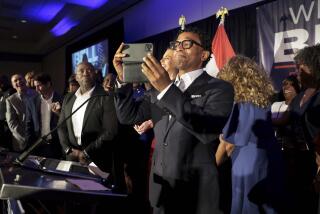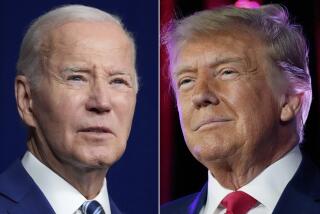Santorum deals Romney a setback by winning Missouri
Rick Santorum dealt Mitt Romney a setback Tuesday night, winning the presidential primary in Missouri as Republicans in three states voted on a day that could produce a shift in the momentum of the 2012 race.
The former Pennsylvania senator’s victory in the nonbinding “beauty contest” gave him bragging rights on a day when Romney had once been expected to gain a sweep.
Romney, still the favorite for the GOP nomination, had managed to put back-to-back successes together with wins in Florida and Nevada. Now he will have to regroup, with few opportunities to show strength until a pair of primaries that are still three weeks away.
Santorum, whose last victory came more than a month ago in Iowa’s leadoff caucuses, had his best showing since that day. Early returns from caucuses in Minnesota and Colorado also showed Santorum running well.
Rep. Ron Paul, the only candidate without a victory, has been targeting caucus states, including those voting Tuesday, Minnesota and Colorado. Delegates in both states will be apportioned later and Missouri’s primary has no connection to delegate selection.
Romney, who carried Minnesota and Colorado in 2008, scheduled a celebration with supporters in Denver. Sounding confident, he told Colorado voters earlier in the day that their state would have “a little something to say about who our nominee is going to be.”
Santorum chose to stage his election-night event in Missouri, the largest of the three states voting Tuesday and the second most populous to vote so far this year. One of his arguments to Republican voters is his ability to carry electoral battlegrounds, like his home state of Pennsylvania -- and Missouri in the past has fit that mold.
In 2012, though, Colorado and Minnesota are more likely to be competitive in the general election, while Missouri has become reliably Republican.
In Colorado and Minnesota, voters were gathered at precinct caucuses, where a straw poll of attendees was conducted to reflect the presidential preferences of party activists.
Tuesday’s caucuses were conducted under the same process as those in Iowa, which took weeks to sort out. Romney initially was said to be the winner, but after state party officials checked ballots Santorum was eventually was declared the winner, defeating Romney by 34 votes out of more than 121,500 cast.
The Missouri primary provided Santorum with his clearest opportunity yet to go head-to-head with Romney as the conservative alternative, since Newt Gingrich failed to qualify for the statewide ballot. Gingrich and Santorum have competed to eliminate the other and become the ultimate choice of the party’s most ardent conservatives against Romney.
But their cause -- stopping the front-runner -- is likely to have a better chance of succeeding if both Santorum and Gingrich remain viable candidates, at least for now. Recent primary polling has indicated that if one of them were to drop out, at least a portion of his support would go to Romney, allowing the former Massachusetts governor to gain delegates more quickly than if the anti-Romney vote continued to be divided among several candidates.
Turnout in Missouri was reported to be low, and the candidates have spent little time campaigning there since the election is a “beauty-contest” with no bearing on delegates to the national convention. State law required the primary to take place, and in most parts of the state, the presidential contest was the only item on the ballot. But, because of its early timing, Republican National Committee rules would have penalized Missouri for using the primary to select delegates. As a result, the state party opted to pick them in a separate caucus process that starts next month.
Even before the primary season began, Romney strategists were concerned about the difficulty of maintaining momentum during February, a month in which relatively few states hold binding contests. The next round of primaries isn’t until Feb. 28, when Michigan and Arizona vote.
Facing possible setbacks Tuesday, the Romney camp moved to lower expectations and said the former Massachusetts governor is prepared to wage a “methodical, long-haul campaign,” with more money and organization than either Santorum or Gingrich.
A memo, sent out from the Boston headquarters as voting was under way in Missouri and soon to begin in the other states, argued that “there is no way for any nominee to win first place in every single contest” and “we expect our opponents to notch a few wins, too.”
“Romney is the only candidate prepared to compete in simultaneous campaigns across the country,” Rich Beeson, the Romney campaign’s political director, said in the memo. As for the others, “[e]ven ‘success’ in a few states will not mean collecting enough delegates to win the nomination.”
Gingrich, in a tacit acknowledgement that he did not expect to do well on Tuesday, spent the day campaigning in Ohio. The Midwest state is one of 11 that will vote on March 6, known as Super Tuesday.
The former House speaker, seeking to turn his candidacy around that day, needs a strong showing in Ohio -- the largest Super Tuesday state and one of the biggest general-election battlegrounds -- to bolster his argument that he still has a chance to become his party’s nominee.
More to Read
Sign up for Essential California
The most important California stories and recommendations in your inbox every morning.
You may occasionally receive promotional content from the Los Angeles Times.










